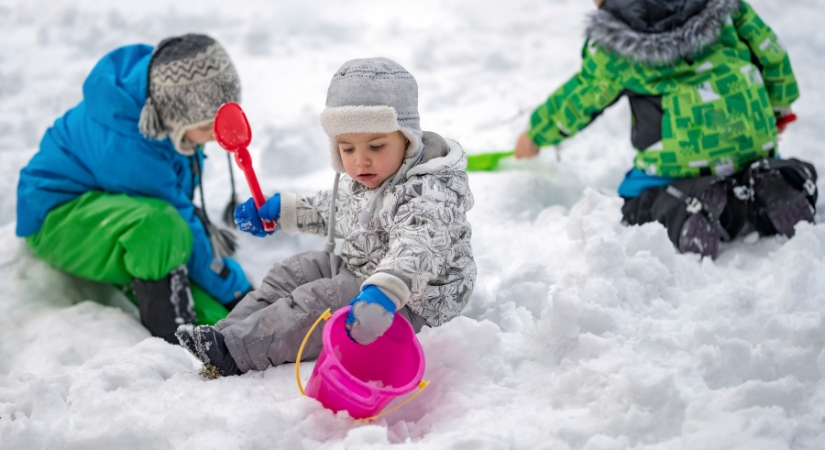As professionals dedicated to nurturing young minds, we’re all aware of the importance of outdoor play. However, when winter arrives, there’s often a tendency to limit outdoor experiences for our little ones. Let’s explore why we should be encouraging outdoor experiences and play for young children, regardless of the weather.
Developmental Benefits
We’re all aware that the early years are a critical period for development. Let’s consider the rich developmental opportunities winter outdoor play provides.
Outdoor spaces naturally encourage gross motor skill development
Whether it’s a 10-month-old learning to crawl on uneven ground or a 2-year-old navigating a slippery path, these experiences challenge their balance and coordination in ways indoor environments simply can’t replicate.
Fine motor skills also get a workout
Encourage children to manipulate snow, pick up small objects while wearing mittens, or attempt to zip up their coats. These activities, while seemingly simple, are excellent for developing dexterity and hand-eye coordination in day-to-day tasks.
Cognitive development thrives in winter settings
Problem-solving skills are honed as children figure out how to build simple snow structures or navigate icy patches. The concept of cause and effect becomes tangible as they observe phenomena like footprints in snow or their visible breath in cold air. Observing weather changes, interacting with natural materials, and problem-solving (how to climb over that log, for instance) all also contribute to cognitive growth.
Different textures allow for sensory exploration
Another reason for the importance of outdoor play in the winter is due to the sensory exploration it provides. The textures of snow, ice, and frost offer tactile experiences that are seasonally specific. Practitioners can leverage these natural elements to create engaging sensory activities that support neural development.
Describing the seasons helps language development
Winter outdoor play is a fantastic opportunity for language development. It introduces children to season-specific vocabulary and encourages descriptive language as they discuss new sensations, colours, and textures. Consider incorporating winter-themed books or songs to reinforce these linguistic connections.
Winter exploration fosters independence
From a social-emotional perspective, winter play fosters independence as children learn to dress for the weather and explore safely within boundaries. It also provides opportunities for cooperative play, such as working together to build snow structures or sharing winter-specific toys.
Mental Health Benefits
While it might seem a little premature to discuss mental health for such young children, we know that early experiences lay the foundation for future well-being.
Research indicates that exposure to natural environments can lower cortisol (stress) levels, even in very young children. The physical activity involved in outdoor play releases endorphins, contributing to improved mood and emotional regulation.
Even on overcast days, outdoor light exposure can help regulate circadian rhythms and boost serotonin levels, potentially mitigating the effects of Seasonal Affective Disorder, which can affect even young children.
Nature exposure has also been linked to improved focus and attention. For children exhibiting early signs of attention difficulties, regular outdoor experiences can be particularly beneficial. The varied stimuli in a winter landscape naturally encourage mindfulness and present-moment awareness. Fostering an early connection with nature can support early years mental health and environmental stewardship.
The Unique Benefits of Winter Outdoor Play
While it’s tempting to stay indoors during the colder months, winter outdoor play offers some fantastic advantages. With limited daylight hours, outdoor exposure becomes crucial for vitamin D synthesis, which is essential for bone development and immune function. Cold air exposure, contrary to popular belief, can actually strengthen the immune system when managed appropriately.
Winter also offers unique learning opportunities. It’s the perfect time to introduce early concepts of weather, seasonal changes, and environmental awareness. Observing animal tracks in the snow, watching winter birds, or noting changes in deciduous trees can lay the groundwork for scientific thinking and environmental stewardship.
Lastly, maintaining outdoor routines throughout winter helps prevent the onset of cabin fever in both children and practitioners. It provides a much-needed change of scenery and fresh air, supporting the overall well-being of everyone involved in Early Years care.
Implementing outdoor fun
Advocate for and implement winter outdoor activities in your settings. This might involve educating parents about appropriate winter clothing, creating safe outdoor spaces for winter play, and developing winter-specific curriculum elements that align with Early Years learning objectives.
By embracing winter outdoor play, you’re not just filling time – you’re actively contributing to the physical, cognitive, and emotional growth of the children in your care. This is also an excellent opportunity to record and reflect on these developmental milestones. Using tools like eylog, an Early Years online learning journal, nursery practitioners can seamlessly document observations with pictures and videos on the go.
Of course, safety is a primary concern. Ensure children are appropriately dressed for the weather, with layers, waterproof outer garments, and proper footwear. Always maintain appropriate staff-to-child ratios and be vigilant about potential hazards like icy patches.
Sharing winter activities
With eylog you can share delightful pictures with parents of their little ones having fun in the great outdoors. You can also share messages with parents or staff, schedule events, block children’s sessions and so much more with eyworks.
View winter not as a barrier to outdoor play, but as a unique opportunity to enrich Early Years practice. Let’s bundle up, step outside, and watch our little ones thrive in the winter wonderland!
To find out more about our software, please contact our friendly team at hello@eyworks.co.uk or Book a Demo today.

